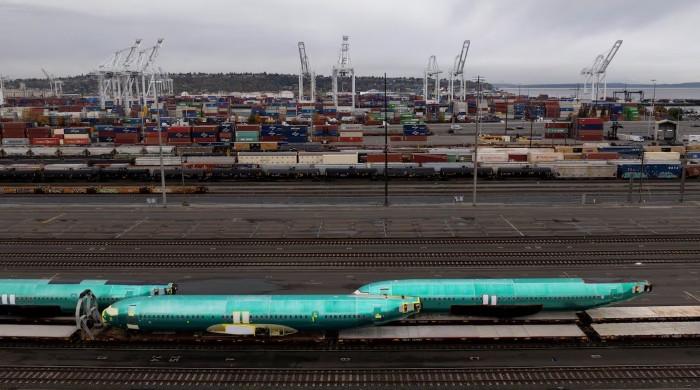China has reportedly directed its airlines to suspend further deliveries of Boeing jets, according to sources familiar with the matter, responding to the US imposition of 145% tariffs on Chinese goods.
Boeing’s shares experienced a dip of 0.5% in midday trading, as China is considered one of its largest markets for growth, while Airbus maintains a strong foothold there.
The global aerospace sector is facing the effects of a US-led trade conflict, with manufacturers, airlines, and suppliers reassessing contracts valued at billions due to uncertainties on who will bear the tariff costs, sparked by US supplier Howmet Aerospace.
Potential confusion regarding tariff changes could cause aircraft delivery delays, leading some airline executives to consider deferring deliveries to avoid duties.
China’s major airlines, including Air China, China Eastern Airlines, and China Southern Airlines, had planned to receive 45, 53, and 81 Boeing aircraft, respectively, between 2025 and 2027.
Additionally, Beijing has requested that Chinese carriers cease purchasing aircraft-related equipment and components from US companies.
While independent confirmation of a comprehensive ban by China on US aircraft parts has not been received, two sources within the aerospace industry stated they were unaware of such a ban.
Analysts suggest that a temporary suspension of deliveries to China would not significantly affect Boeing, as the company could redirect those aircraft to other airlines, and Airbus lacks the capacity to solely meet the country’s demand.
Banning imports of new US parts to support China’s existing aircraft fleet, including the C919, would pose a greater challenge for China.
According to Bank of America analyst Ron Epstein, ceasing the purchase of aircraft components from the US would halt or end the C919 program.
The Chinese government is exploring options to assist airlines leasing Boeing jets that are encountering increased costs.
Notably, China was the first to ground Boeing’s 737 MAX jets after two fatal accidents in 2018 and 2019, resulting in nearly 350 deaths, and suspended most orders and deliveries of the jet in 2019.
Boeing has declined to comment on the matter.
This halt in deliveries to China represents another obstacle for the planemaker, which is undergoing a gradual recovery following a difficult year marked by a labor strike, increased regulatory inspections, and ongoing supply chain issues.
Beijing’s decision follows its move last week to increase levies on US imports to 125% in retaliation against US tariffs. This action would significantly increase the cost of Boeing jets destined for Chinese carriers, potentially leading airlines to consider alternatives such as Airbus and domestic manufacturer COMAC.
Boeing’s shares have lost over a third of their value since a mid-air door panel incident on a new MAX 9 jet last year, which triggered additional challenges for the company.
The escalating trade war between the world’s two largest economies poses a risk of halting goods trade between the two countries, which was valued at over $650 billion in 2024.



Comments (0)
No comments yet. Be the first to comment!
Leave a Comment